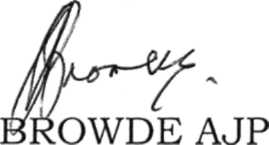IN THE SUPREME COURT OF SWAZILAND


HELD AT MBABANE CML. APPEAL NO. 38/2005
In the matter between:
1st APPELLANT 2nd APPELLANT 3rd APPELLANT THE TEACHING SERVICE COMMISSION THE MINISTER OF EDUCATION THE ATTORNEY GENERAL
v
ISIAH DLAMINI RESPONDENT
BROWDE AJP TEBBUTT JA BANDA JA CORAM
FOR THE APPLICANTS FOR THE RESPONDENTS MR. L. MAZIYA MR. M. MABILA
JUDGMENT BANDA, JA [1] This is an appeal against the judgment of the Acting Chief Justice where he set aside the order made by the Teaching Service Commission. The Commission had found the respondent guilty of serious immoral conduct
and had ordered that he be dismissed from his teaching post. The respondent applied to the High Court for a review of the order of the Commission and prayed that it be set aside. He further prayed that he be reinstated to his job as a head teacher. [2] The Teaching Service Commission was created by the Teaching Service Act 1982 and the Regulations which have been promulgated, under its statutory authority, came into force on 2nd May 1983. These Regulations deal, inter alia, with allegations of misconduct on the part of members of the teaching service. It is the Ministry of Education which administers the Teaching Service Act and the Regulations made thereunder. [3] The respondent is a school teacher and was, at the material time, head teacher at Nhlangano Central Primary School. On 30th April 2004 he received a letter from the appellant's schools manager. It was signed by a Mr. D.P. Simelane, the Under Secretary responsible for Schools Management. The letter was copied to Mbali Smith, the complainant in this case, and to the REO. The letter informed the respondent that he was being charged with immoral conduct and it proceeded to give details of the misconduct regarding the dates and places
where the alleged acts of misconduct took place. The letter asked the respondent to show cause, in writing, why disciplinary action could not be taken against him. The letter further asked the respondent to give his response on or before the 14th May 2004. Finally the letter invited the respondent to attend a meeting with the Under Secretary, Schools Management on the 14th May 2004 at the Ministry of Education beginning at 1000 hrs. The letter was in the following terms - "TSC 4304 30th April 2004 Isaiah Mphikeleli Dlamini Nhlangano Central Primary School P.O. Box 39 NHLANGANO Dear Teacher, MISCONDUCT: YOURSELF You are hereby charged with immoral conduct for the following allegations:
During the period including terms two and three of 2003 you had sexual intercourse in four different occasions with all year old grade 6 (sic) pupil, Mbali Smith. The first sexual encounter took place in the office of the head teacher. The rest took place in the house of the head teacher. The pupil who has recently turned 12 years old left your school and is currently doing Grade 7 in another school. The above allegations are very serious. The parent of this pupil entrusted the education and protection of the child to you as head of school. It is inconceivable how you could betray that trust the parent had in you as custodian of the pupil while under your care in school. Show cause in writing why disciplinary action should not be taken against yourself for misconduct.
Your reply must reach this office before/on the 14th May 2004. You are invited to attend a meeting with the Under Secretary, Schools Management on the 14th May 2004 in the Ministry of Education beginning at 1000 hrs. Yours faithfully, P.P. Simelane US, Schools Management cc: Mbali Smith R.E.O. On 10th September 2004, the respondent was invited by letter, to appear before the Teaching Service Commission on 22nd September 2004 at 9.00 a.m. The respondent was informed that his appearance at the Commission was related to the allegations of misconduct which had been made against him by the schools manager in his letter of 30th April 2004. He was advised to bring witnesses and any evidence that he might require. The letter, it would appear, was again copied to the REO and
to the guardian of Mbali Smith. It is in the following words - "10 September 2004 TSC 4304 Dlamini Mphikeleli Nhlangano Central Primary School P.O. Box 39 NHLANGANO Dear Sir, RE- INVITATION Mr. Dlamini, I am duly authorized to invite you to appear before the Teaching Service Commission on the 22nd day of September 2004 at 9.00 a.m. This is in relation to the charge of immoral conduct preferred against you by the School Manager in his letter dated 30th April 2004. Should you require witnesses/evidence please bring it with you. By copies hereof the REO (Shiselweni Region) guardian of Mbali Smith, and the minor herself
(Mbali) are also invited to give evidence on the said allegations against yourself. Yours faithfu lly, M.V. Zungu Executive Secretary [5] It is common cause to both parties that a disciplinary inquiry was held by the Commission at which the respondent presented himself. It was after that hearing that the Commission found the respondent guilty of the misconduct and ordered his dismissal from his teaching post. [6] It was that order of dismissal that was the subject of the application for the review in the court below. There can be no doubt, that when the Commission sits to hear disciplinary matters, it is sitting in a quasi-judicial capacity. In that capacity the Commission is bound to conduct its meetings in accordance with principles of natural justice and rules of public law: JOHN KUNENE V THE TEACHING SERVICE COMMISSION, THE ATTORNEY GENERAL, AND THE UNDER SECRETARY, EDUCATION Civil Appeal No. 15/2006.
The jurisdiction of the High Court to review the decision of public bodies only arises as follows:- "Whenever a public body has a duty imposed upon it by statute, and disregards important provisions of the statute, or is guilty of gross irregularity or clear illegality in the performance of a duty, this court (i.e. High Court) may be asked to review the proceedings complained of and set aside or correct them". by Innes CJ in the case of Johannesburg Consolidation Investment Coy v Johannesburg Town Council 1903 TS 111 at 115. It is quite clear, therefore, that before the High Court can exercise its power of reviewing the decision of a public body it must be shown that the public body concerned had, "disregarded important provisions of the statute which created it or that it was guilty of gross irregularity or that there was a clear illegality committed.".
The respondent had the onus to prove, in the court below, that there were sufficient grounds to invoke the court's jurisdiction to review the Commission's decision. [9] The trial judge accepted, as correct, the proposition of the law as set out in the case of National Transport and Another v Chetty Motor Transport (Pty) Ltd 1972 (3) 726 (A) at 735 E-H which states as follows- "The Legislature has appointed a commission as a final arbiter in its special field and right or wrong, for better or worse, reasonable or unreasonable, its decision stands - unless it is vitiated by proof on review by the Supreme Court that - (a) the commission failed to apply its mind to the issues in accordance with behests of the statute and the tenets of natural justice. In other words that, de jure, it failed to decide the matter at all. Such failure could be established by reference to mala fides, improper motive, arbitrariness or caprice.
(b) the Commission's decision was grossly unreasonable to so striking a degree as to warrant the inference of a failure to apply its mind as aforesaid". [10] During the proceedings in the lower court the respondent contended in his affidavit that although he was requested to respond to the allegations, "no charges were preferred against me. It was not clear to what I was defending myself. There were no dates mentioned and I could not even bring witnesses". And he further states - "I was never given an opportunity to cross-examine any of the witnesses. This right was never explained to me nor was it ever accorded to me" And again he states - "I am advised and verily believe that the manner in which my whole matter was handled was extremely irregular and should be set aside as a nullity".
[11] These statements by the respondent cannot be true. The record of the disciplinary proceedings clearly shows that the respondent knew the charges which he was being called to answer and the record also shows that the respondent was given the opportunity to cross-examine. The record reads - "Mr. Dlamini you can make your submission and cross-examine the witnesses" Indeed the letter of 30th April 2004 specifically informed him of the charges with details of the misconduct which was being leveled against him. Equally the letter of 10th September 2004 which invited him to attend disciplinary proceedings at the Commission specifically asked him to bring witnesses and evidence that he might require. [12] The trial judge in the Court below, after referring to the record of proceedings before the Commission at page 39 of the Court record, at page 6 and paragraph 7 of his judgment stated, in the following terms - "From this it is prima facie clear that the applicant/accused at the hearing did not appreciate what was afforded to him. He did not appreciate when, looking at his response, that he now was afforded the opportunity to cross-examine or also to give his own evidence.
The respondent contends that this prima facie appearance of non-understanding of his rights by accused or applicant cannot be held to be what it seems to be. It says that the applicant improperly relies on the absence of the right to cross-examine and further that the disciplinary tribunal is entitled to follow its own rules of procedure when conducting such enquiry". [13] And more importantly the trial judge on the same page of his judgment but from paragraph 8 he states as follows - "However, once a disciplinary tribunal like the Teaching Service Commission, in its proceedings complained of, has adopted some of the natural rules of justice, namely audi alteram partem principle and also the right to cross-examine witnesses that testify against the person under enquiry, then that commission is bound to follow the rules and procedure that it has adopted." [14] The respondent is a mature adult person who had been a teacher for some years and had risen to the position of head teacher at a Central Primary School. And to
suggest that such an individual, with his level of education, would not appreciate or understand the meaning of cross-examination when he is told "Mr. Dlamini you can make your submission and cross-examine the witnesses" is, to say the least, beyond comprehension. [15] The above passage from the judgment of the lower court would appear to be the basis of Mr. Mabila's submissions in this appeal. Mr. Mabila submitted that the procedure which the Commission followed was irregular because, he contends, once the Commission had adopted a procedure which is followed at a trial, they should have explained to the respondent the meaning of cross-examination and that, because they did not do so, the proceedings were irregular and constituted a failure of justice. It was also Mr. Mabila's contention that it was irregular for the Commission to have allowed the respondent to give evidence in the presence of the complainant. We asked Mr. Mabila to point to a passage in the proceedings before the Commission which would have prejudiced the respondent's case; he was unable to do so.
It is true that in a criminal trial it becomes incumbent upon a trial judge and this is especially so where the accused is not legally represented, to explain to the accused what is the import of cross-examination and to inform the accused that he has the right to call witness in his defence. The statement by the trial judge that the commission should have followed this procedure in order to ensure that the record of its proceedings were "substantially and substantively and procedurally fair" was, with respect, not correct. The procedure which the trial judge was urging the Commission should have followed is precisely what public bodies are not obliged to follow. The proceedings which the Commission held during the disciplinary inquiry against the respondent were, as we have already observed in this judgment, quasi-judicial and are covered by the procedure which is set out in ROSE-INNES: JUDICIAL REVIEW OF ADMINISTRATIVE TRIBUNALS at page 160. That passage is also cited in the case of Davies v Chairman, Committee of JSE 1991 (4) SA 43 at page 49 and it is in the following terms - "Administrative bodies, generally speaking, and subject to the provisions of the statutes which constitute them, are free to decide and adopt
their own procedure, provided such procedures are not calculated to cause inequity or apprehensions of bias in those who are subject to their decisions. They are not obliged to adopt methods of oral evidence and examination of witnesses which are necessary for a trial in court. The rules of natural justice do not therefore, compel the holding of an inquiry in the sense of proceedings at which witnesses are called and examined." We have examined the record of the disciplinary proceedings before the Teaching Service Commission and are satisfied and find that the principles of natural justice were not breached. The charges against the respondent were clearly set out in the letter which was sent out to him on 30th April 2004. That letter clearly informed the respondent about the dates and the places where the alleged acts of misconduct were committed. He was told to bring witnesses and any evidence he might require. He was given every opportunity to put his version of the story to the commission but never did. We find that the principle of audi alteram partem was fully complied with. Mr. Maziya must be right when he submits that there was no failure of justice in the
manner in which the Commission conducted its proceedings. There was neither a gross irregularity nor a clear illegality in the manner in which the Commission conducted its disciplinary proceedings against the respondent. We find, therefore, that the respondent did not discharge the onus which was on him to show that sufficient grounds existed for the court below to review the Commission's decision. In the result this appeal must succeed, with costs and the decision of the appellant, the Teaching Service Commission terminating the respondent's employment is hereby restored.
I agree


I agree TEBBUTT JA
Delivered on this day of May, 2007.![]()
1